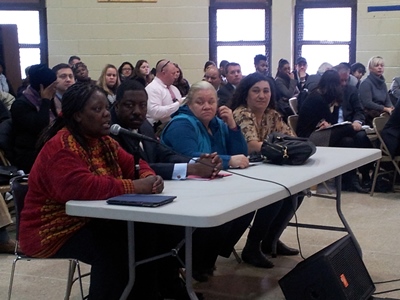Despite residents’ protests temporary NYCHA boilers to remain

Temporary boilers installed in city housing complexes after Superstorm Sandy will be staying there for at least another two heating seasons—through 2015—despite community concerns about inefficiency and flat-out lack of functionality.
That is according to representatives from the city Housing Authority (NYCHA), who joined Sandy-stricken residents to testify at a public hearing of the City Council’s Committee on Public Housing (CPH) and Committee on Resiliency and Recovery (CRR), held on Thursday, February 27 in Coney Island’s Carey Gardens Community Center.
The hearing, held for the first time outside of Manhattan in one of the neighborhoods actually impacted by the issues up for discussion, was a chance for NYCHA residents to testify about their post-Sandy experiences over the past year in alternately too-cold and too-hot conditions, what kind of response they have received from NYCHA, and what they hope/want/need to see from them and city officials going forward.